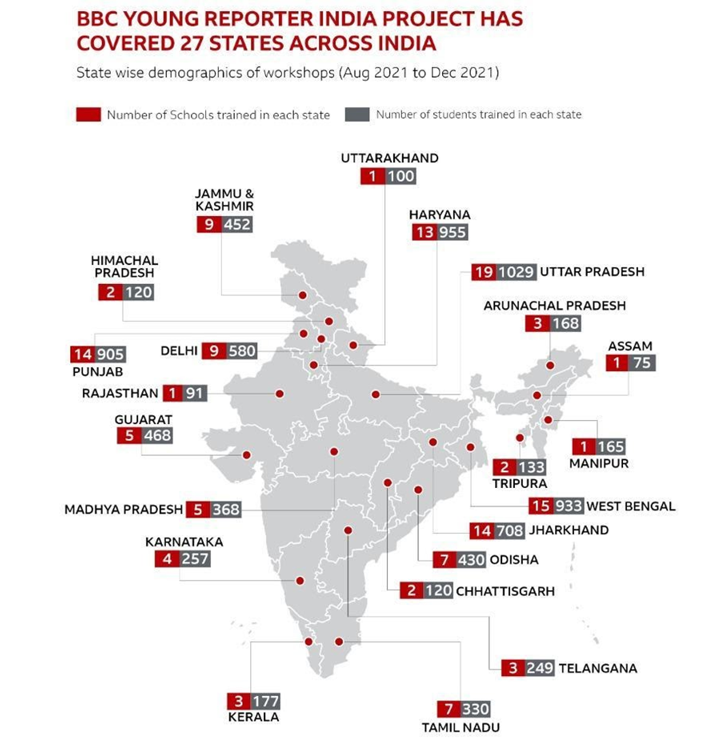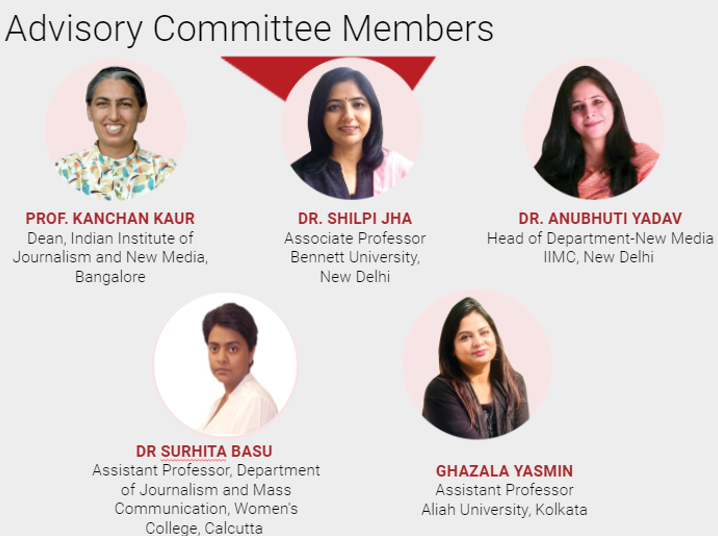
 BBC Young Reporter India (BBC YRI) has reached over eight thousand students in one hundred and sixty schools, including sixteen government schools across twenty-seven states in India.
BBC Young Reporter India (BBC YRI) has reached over eight thousand students in one hundred and sixty schools, including sixteen government schools across twenty-seven states in India.
BBC YRI is a media education programme aimed to provide media literacy skills to young people aged thirteen and above. It was launched in India by BBC News in partnership with Internews and in collaboration with DataLeads in the last quarter of year 2021.
Following the success of the programme, young people have learned about critical thinking, fact-checking and digital safety provided through virtual workshops during the height of the pandemic when harmful and misleading information about vaccinations, and fake Covid-19 cures were in wide circulation.
The programme would like to invite more educators to make use of the powerful workshops, exercises, videos, and tutorial notes that can be used freely to benefit the next generation of news consumers across India. More details here, https://www.bbc.com/beyondfakenews/young-reporter-india/.
The journey so far:
• 180+ teachers benefitted
• 250+ hours of media training conducted remotely
• Comprehensive training material developed
• BBC YRI newsletter reached 100+ schools
• 51 trainers selected and trained, including 24 media educators, 13 teachers, 3 journalists and 11 others.
The programme adapted components of the already successful BBC Young Reporter programme in the UK, emphasising that students should pause and think before sharing emotional and unverified content with family and friends. You can see how the workshops were developed and delivered in this video. https://www.bbc.com/beyondfakenews/what-is-fake-news/
The trainers demonstrated many of the techniques used by journalists to evaluate information. The students were encouraged to use the BBC’s “REAL checks” tools and to ask simple questions used by journalists’ questions, like Who? How? When? Why? Where?”. They also shared tools for checking and verifying content. The interactive activities and analytical tools can be used beyond the classroom, encouraging curiosity, and building student confidence in their ability to spot misleading content.
The workshops use local, up to date examples, and encourage participants to build local communities of critical thinkers. Post workshops the students came up with variety of content to share with their schoolmates, and families beyond the classroom, which was showcased in BBC YRI newsletters.
BBC Reality Check’s India Reporter, Shruti Menon, helped develop and deliver the programme. She says the spread of harmful fake news is a huge problem in India, “In my role as a journalist, besides reporting on stories, it is important to share my insights, knowledge and experiences of using tools and techniques in fact checking – to help our young audiences not to be fooled by the deluge of misinformation around us.”
BBC YRI programme has demonstrated that there is both a hunger and need for this training in India. Shruti will continue to support the project by training her BBC colleagues to deliver workshops in schools.
Rupa Jha, Head of India, BBC News emphasised the importance of focusing on young people – our future audiences, “We think it’s important that we not only cover and bust fake news, but it is also important to educate the next generation. They are going to face the menace of this demon.”
The BBC, Internews and DataLEADS believe that the future of trusted media is dependent on audiences who understand how to evaluate and value truthful, independent news. As Tim Davie, the BBC’s Director General said, from Delhi to the recent Trust in News Conference in March 2022, “We know that encouraging audiences to think critically about the information they consume is essential to the future of trusted news.”
The workshops received a very positive response from schools, teachers, and students. See below for more information.
QUOTES FROM PARTICIPANTS
Feedback from students
It was very informative…..it is very important to make aware of what is real and fake news. We wish that such type of workshop should reach many more students and get benefitted in future.”
“This webinar has been very helpful and very informative. It made me more conscious about fake news and all. We should have such types of webinars in the future.”
“It was a very informative and productive webinar which helped us to differentiate between fake and real news.”
It helped me to step into the shoes of a reporter, it helped me practice critical thinking, and confidently choose information and reject online misinformation. We should think twice before sharing any information or news or forming an opinion based on online information. Fortunately, there is a lot we can do to avoid this.”
Feedback from teachers and principles
• “The workshop was very fruitful and it really educated the participants about the importance of factual news and how to effectively prevent fake news on social media platforms. Overall the workshop was very engaging and provided a first hand opportunity to young minds to learn the nuances of news making in digital world.” Deepti Kandhari, Delhi Public School, Jammu & Kashmir
• “The topic that you have discussed is pertinent in today’s environment, where fake information and misinformation is creating social havoc. Your effort in enabling the students to deal with this social menace by accepting credible information through real check, will help them and the community at large. In fact many students were so moved by your brilliant programme that some of them even planned to become future journalists.” Srabani Dasgupta, Pramila Memorial Institute, West Bengal
• “With about 40% of school children being on various social media platforms it becomes imperative that they are equipped with skills to discern fake news. In these workshops, the students were made aware of their role in tackling this challenge as combating fake news and other such concerns, that is our collective responsibility.” Ruchi Sharma, Vivek High School, Punjab 
Student / Teen Media Literacy Champion Network
Students used multiple ways to share their experience (such as skits, assembly speeches, short videos, posters, cartoons, slogans, poems, letters, and jingles) and educate the world outside about fact-checking and debunking misinformation. As well as sharing activities via the programme workshops.
